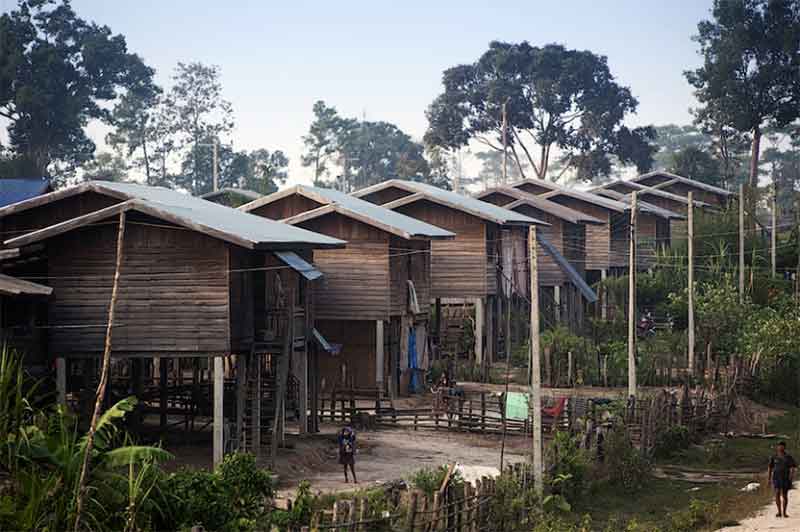
‘World Localization Day’ will be celebrated on 20 June. Organised by the non-profit Local Futures, this annual coming together of people from across the world began in 2020 and focuses on the need to localise supply-chains and recover our connection with nature and community. The stated aim is to “galvanize the worldwide localization movement into a force for systemic change”.
Local Futures, founded by Helena Norberg-Hodge, urges us to imagine a very different world, one in which most of our food comes from nearby farmers who ensure food security year round and where the money we spend on everyday goods continues to recirculate in the local economy.
We are asked to imagine local businesses providing ample, meaningful employment opportunities, instead of our hard-earned cash being immediately siphoned off to some distant corporate headquarters.
Small farms would be key in this respect. They are integral to local markets and networks, short supply chains, food sovereignty, more diverse cropping systems and healthier diets. And they tend to serve the food requirements of communities rather than the interests of big business, institutional investors and shareholders half a world away.
If the COVID lockdowns and war in Ukraine tell us anything about our food system, it is that decentralised, regional and local community-owned food systems based on short(er) supply chains that can cope with future shocks are now needed more than ever.
The report Towards a Food Revolution: Food Hubs and Cooperatives in the US and Italy offers some pointers for creating sustainable support systems for small food producers and food distribution. Alternative, resilient food models and community supported agriculture are paramount.
Localization involves strengthening and rebuilding local economies and communities and restoring cultural and biological diversity. The ‘economics of happiness’ is central to this vision, rather than an endless quest for GDP growth and the alienation, conflict and misery this brings.
It is something we need to work towards because multi-billionaire globalists have a dystopian future mapped out for humanity which they want to impose on us all – and it is diametrically opposed to what is stated above.
The much-publicised ‘great reset’ is integral to this dystopia. It marks a shift away from ‘liberal democracy’ towards authoritarianism. At the same time, there is the relentless drive towards a distorted notion of a ‘green economy’, underpinned by the rhetoric of ‘sustainable consumption’ and ‘climate emergency’.
The great reset is really about capitalism’s end-game. Those promoting it realise the economic and social system must undergo a reset to a ‘new normal’, something that might no longer resemble ‘capitalism’.
End-game capitalism
Capital can no longer maintain its profitability by exploiting labour alone. This much has been clear for some time. There is only so much surplus value to be extracted before the surplus is insufficient.
Historian Luciana Bohne notes that the shutting down of parts of the economy was already happening pre-COVID as there was insufficient growth, well below the minimum tolerable 3% level to maintain the viability of capitalism. This, despite a decades-long attack on workers and corporate tax cuts.
The system had been on life support for some time. Credit markets had been expanded and personal debt facilitated to maintain consumer demand as workers’ wages were squeezed. Financial products (derivatives, equities, debt, etc) and speculative capitalism were boosted, affording the rich a place to park their profits and make money off money. We have also seen the growth of unproductive rentier capitalism and stock buy backs and massive bail outs courtesy of taxpayers.
Moreover, in capitalism, there is also a tendency for the general rate of profit to fall over time. And this has certainly been the case according to writer Ted Reese, who notes it has trended downwards from an estimated 43% in the 1870s to 17% in the 2000s.
The 2008 financial crash was huge. But by late 2019, an even bigger meltdown was imminent. Many companies could not generate enough profit and falling turnover, squeezed margins, limited cashflows and highly leveraged balance sheets were prevalent. In effect, economic growth was already grinding to a halt prior to the massive stock market crash in February 2020.
Fabio Vighi, professor of critical theory, describes how, in late 2019, the Swiss Bank of International Settlements, BlackRock (the world’s most powerful investment fund), G7 central bankers, leading politicians and others worked behind closed doors to avert a massive impending financial meltdown.
The Fed soon began an emergency monetary programme, pumping hundreds of billions of dollars per week into financial markets. Not long after, COVID hit and lockdowns were imposed. The stock market did not collapse because lockdowns occurred. Vighi argues lockdowns were rolled out because financial markets were collapsing.
Closing down the global economy under the guise of fighting a pathogen that mainly posed a risk to the over 80s and the chronically ill seemed illogical to many, but lockdowns allowed the Fed to flood financial markets (COVID relief) with freshly printed money without causing hyperinflation. Vighi says that lockdowns curtailed economic activity, thereby removing demand for the newly printed money (credit) in the physical economy and preventing ‘contagion’.
Using lockdowns and restrictions, smaller enterprises were driven out of business and large sections of the pre-COVID economy were shut down. This amounted to a controlled demolition of parts of the economy while the likes of Amazon, Microsoft, Meta (Facebook) and the online payment sector – platforms which are dictating what the ‘new normal’ will look like – were clear winners in all of this.
The rising inflation that we currently witness is being blamed on the wholly avoidable conflict in Ukraine. Although this tells only part of the story, the conflict and sanctions seem to be hitting Europe severely: if you wanted to demolish your own economy or impoverish large sections of the population, this might be a good way to go about it.
However, the massive ‘going direct’ helicopter money given to the financial sector and global conglomerates under the guise of COVID relief was always going to have an impact once the global economy reopened.
Similar extraordinary monetary policy (lockdowns) cannot be ruled out in the future: perhaps on the pretext of another ‘virus’ but possibly based on the notion of curtailing human activity due to ‘climate emergency’. This is because raising interests rates to manage inflation could rapidly disrupt the debt-bloated financial system (an inflated Ponzi scheme) and implode the entire economy.
Permanent austerity
But lockdowns, restrictions or creating mass unemployment and placing people on programmable digital currencies to micromanage spending and decrease inflationary pressures could help to manage the crisis. ‘Programmable’ means the government determining how much you can spend and what you can spend on.
How could governments legitimise such levels of control? By preaching about reduced consumption according to the creed of ‘sustainability’. This is how you would ‘own nothing and be happy’ if we are to believe this well-publicised slogan of the World Economic Forum (WEF).
But like neoliberal globalization in the 1980s – the great reset is being given a positive spin, something which supposedly symbolises a brave new techno-utopian future.
In the 1980s, to help legitimise the deregulated neoliberal globalisation agenda, government and media instigated an ideological onslaught, driving home the primacy of ‘free enterprise’, individual rights and responsibility and emphasising a shift away from the role of state, trade unions and the collective in society.
Today, we are seeing another ideological shift: individual rights (freedom to choose what is injected into your own body, for instance) are said to undermine the wider needs of society and – in a stark turnaround – individual freedom is now said to pose a threat to ‘national security’, ‘public health’ or ‘safety’.
A near-permanent state of ‘emergency’ due to public health threats, climate catastrophe or conflict (as with the situation in Ukraine) would conveniently place populations on an ongoing ‘war footing’. Notions of individual liberty and democratic principles would be usurped by placing the emphasis on the ‘public interest’ and protecting the population from ‘harm’. This would facilitate the march towards authoritarianism.
As in the 1980s, this messaging is being driven by economic impulses. Neoliberalism privatised, deregulated, exploited workers and optimised debt to the point whereby markets are now kept afloat by endless financial injections.
The WEF says the public will ‘rent’ everything they require: stripping the right of personal ownership under the guise of ‘sustainable consumption’ and ‘saving the planet’. Where the WEF is concerned, this is little more than code for permanent austerity to be imposed on the mass of the population.
Metaverse future
At the start of this article, readers were asked to imagine a future based on a certain set of principles associated with localization. For one moment, imagine another. The one being promoted by the WEF, the high-level talking shop and lobby group for elite interests headed by that avowed globalist and transhumanist Klaus Schwab.
As you sit all day unemployed in your high-rise, your ‘food’ will be delivered via an online platform bought courtesy of your programmable universal basic income digital money. Food courtesy of Gates-promoted farms manned by driverless machines, monitored by drones and doused with chemicals to produce crops from patented GM seeds for industrial ‘biomatter’ to be engineered, processed and constituted into something resembling food.
Enjoy and be happy eating your fake food, stripped of satisfying productive endeavour and genuine self-fulfilment. But really, it will not be a problem. You can sit all day and exist virtually in Zuckerberg’s fantasy metaverse. Property-less and happy in your open prison of mass unemployment, state dependency, track and chip health passports and financial exclusion via programmable currency.
A world also in which bodily integrity no longer exists courtesy of a mandatory vaccination agenda linked to emerging digital-biopharmaceutical technologies. The proposed World Health Organization pandemic treaty marks a worrying step in this direction. Leslyn Lewis addresses WHO pandemic treaty – The Counter Signal
This ‘new normal’ would be tyrannical, but the ‘old normal’ – which still thrives – was not something to be celebrated. Global inequality is severe and environmental devastation and human dislocation has been increasing. Dependency and dispossession remain at the core of the system, both on an individual level and at local, regional and national levels. New normal or old normal, these problems will persist and become worse.
Green imperialism
The ‘green economy’ being heavily promoted is based on the commodification of nature, through privatization, marketization and monetary valuation. Banks and corporations will set the agenda – dressed in the garb of ‘stakeholder capitalism’, a euphemism for governments facilitating the needs of powerful global interests. The fear is that the proposed system will weaken environmental protection laws and regulations to facilitate private capital.
The banking sector will engage in ‘green profiling’ and issue ‘green bonds’ and global corporations will be able to ‘offset’ (greenwash) their environment-degrading activities by, for example, protecting or planting a forest elsewhere (on indigenous people’s land) or perhaps even investing in (imposing) industrial agriculture which grows herbicide-resistant GMO commodity crop monocultures that are misleadingly portrayed as ‘climate friendly’. Imperialism wrapped in green.
Relying on the same thinking and the same interests that led the world to where it is now does not seem like a great idea. This type of ‘green’ is first and foremost a multi-trillion market opportunity for lining pockets and part of a strategy that may well be used to secure compliance required for the ‘new normal’.
The future needs to be rooted in the principles of localization. For this, we need look no further than the economics and the social relations that underpin tribal societies (for example, India’s indigenous peoples). The knowledge and value systems of indigenous peoples promote long-term genuine sustainability by living within the boundaries of nature and emphasise equality, communality and sharing rather than separation, domination and competition.
Self-sufficiency, solidarity, localization and cooperation is the antidote to globalism and the top-down tyranny of programmable digital currencies and unaccountable, monopolistic AI-driven platforms which aim to monitor and dictate every aspect of life.
Colin Todhunter is an independent writer and receives no payment from any media outlet or organization for his work. If you appreciated this article, consider sending a few coins his way: [email protected]

















































